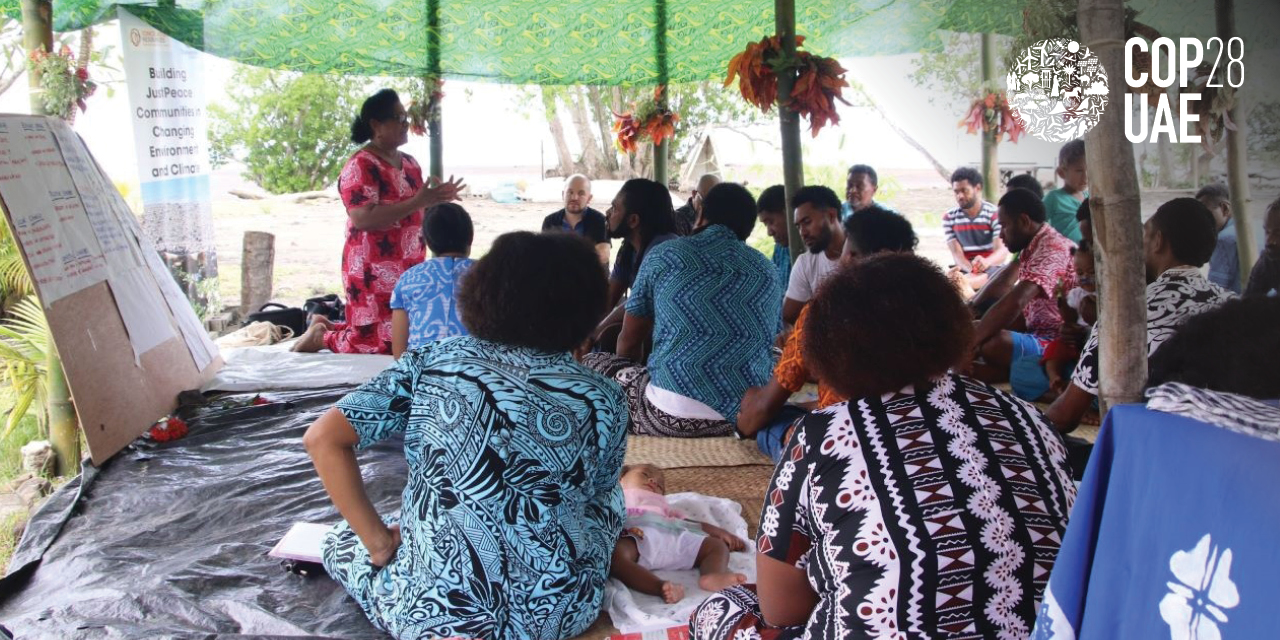Climate Change and Conflict By Mercy Masta | 19 November, 2023
Building Peace Amidst Climate Challenges: Insights from Conciliation Resources

Image: Transcend Oceania
Pursuing global ambitions for peace, gender equality and inclusion within a changing climate has rarely seemed so perilous. Yet more than ever, we're aware that these goals are connected and even complementary. At Conciliation Resources (CR), an international peacebuilding organisation, we recently published two practice papers that delve into the complex interplay of climate change, gender, culture and peacebuilding, aiming to not only support the prevention of climate change related conflict but to also foster a more inclusive, understanding and peaceful world.
Our first paper, titled A Changing Climate For Peace: Navigating Conflict in the Climate Crisis explores the intricate relationship between climate change, conflict, and peacebuilding. Drawing from our experiences in the Philippines (Bangsamoro), Uganda (Karamoja), and Pakistan-administered Kashmir, we show how climate change deepens existing vulnerabilities, intensifying tensions between various groups and governments.
One of the core takeaways is the need for integrated approaches, requiring collaboration between communities, governments, and civil society organisations (CSOs) as well as across different sectors. Investments in local CSOs, collaborative policy making, and integrating civil society perspectives into strategic planning are also essential, as is the meaningful participation of communities and the role of external actors in climate and conflict systems. Sustained, informed collaboration can minimise the potential harm from climate change mitigation and adaptation policies and initiatives.
Additionally, it’s important to understand diverse needs and cultural contexts, addressing gender disparities, and involve local actors in policy making and implementation. We advocate for embedding an intersectional analysis in all climate and conflict peacebuilding programming, ensuring responses are informed by contextual expertise and meaningful participation from affected communities and stakeholders. We outline local peacebuilding responses to climate change and conflict, which rely on participation and inclusion of a broad range of those affected by climate change in policy making. Examples from Kashmir demonstrate initiatives like ecological entrepreneurship to engage youth and bridge divisions between communities and policy makers, emphasising the importance of inclusive policy making and environmental cooperation as a confidence-building measure.
Our second paper, titled Gender, Culture Identity, Conflict and Climate Change: Understanding Relationships’, delves into the efforts of Conciliation Resources and our partners to promote peace by addressing social inequalities, particularly gender disparities, and their connection to conflict and climate change. Through workshops conducted in various regions, including Uganda, Pakistan-administered Kashmir, and the Bangsamoro, we explored how gender and cultural norms influence people's experiences with climate change and conflict.
In this work we utilised a participatory gender, climate, and conflict analysis tool, involving six key steps, designed to empower marginalised groups, particularly women. These sessions, engaging pastoralists, youth groups, academics, journalists, mediators, and government representatives, aimed to understand diverse perspectives and experiences related to climate change, gender and conflict. The findings underscore that gendered responses to climate change operate at multiple levels and can reinforce inequalities within communities and governments.
Government-led climate responses, despite recent increases in climate funding, risk disregarding the often-marginalised diverse gender and cultural identity groups, exacerbating tensions and conflicts. Gendered norms and biased international interventions can drive adversarial approaches and entrench existing power imbalances, displacing local knowledge and undermining the effectiveness and sustainability of climate change-related conflict solutions. It is important to analyse and respond to gender and cultural dynamics in peacebuilding and climate change action to avoid amplifying existing inequalities and conflicts. We also highlight the challenges for developing inclusive solutions posed by climate change urgency, militarised approaches, and global anti-gender movements.
Climate change exacerbates existing gender inequalities and power imbalances, making it harder for marginalised groups to adapt. Gendered responses to climate change, including masculine coping strategies, can drive violence within communities. Government responses that do not address gendered needs can fuel grievances and escalate conflicts. We suggest addressing underlying inequalities, leveraging climate initiatives for peacebuilding, integrating gender analysis into policies, promoting gender-responsive climate action, and investing in locally-led programmes to prevent climate and gender-related conflicts.
In summary, we at CR advocate for integrated approaches, informed responses, and the inclusive and meaningful participation of affected communities and stakeholders when working to manage the impacts of climate change. By addressing underlying inequalities, leveraging climate initiatives for peacebuilding, integrating gender analysis into policies, promoting gender-responsive climate action, and investing in locally-led programmes, we can help to not only address the physical and social impacts of climate change but to transform the systems and practices that have led to the climate crisis and related conflict risks. Conciliation Resources' work in the gender, climate change and conflict nexus aims to contribute towards a future where mutual understanding, resilience and peace prevail.
Related articles in the COP28 series:
COP, peace and the Pacific Islands (3-minute read)
PCC at COP28: Advocating for phasing out fossil fuels, funding for loss and damage, and peace (3-minute read)
A loss and damage fund in the Pacific? (3-minute read)
Between a rock and a hard place (3-minute read)
This is not climate justice: The Australia–Tuvalu Falepili Union (3-minute read)
COP and the unaccounted loss and damage for Pacific Youth (3-minute read)
A new Pacific Diplomacy for COP28 (3-minute read)
Mercy Masta has been working with Conciliation Resources since May 2021 and is currently a Programme Associate advising on Policy and Learning in the Southeast Asia and the Pacific Programmes. She has worked on Australian Department of Foreign Affairs and Trade programmes in PNG and the Pacific. Dr Masta has a Master of Development and Gender Studies degree from the University of Melbourne and a PhD from the RMIT University in Australia researching masculinities in Fiji and PNG. She is also a Pacific visiting scholar with the Australian National University.